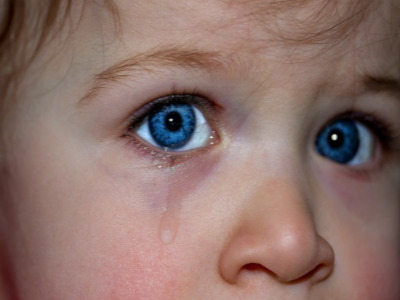Everyone knows the feeling of crying. It can happen while watching a movie that touches us on an emotional level, while reading a beautifully written book that releases something within us, or when a beloved person is showing their positive feelings towards us. These can cause our body to show a natural reaction: tears. We can barely control when, how, or for how long we will cry. People cry for different reasons, like emotional reactions or physical stimuli. From situations where we feel overwhelming joy to moments where we are devastated and feel broken on the inside, the body’s reaction is the same.

There are different reasons why we cry. Of course, this fascinating human phenomenon has the job of protecting your eyes from external influences like dust and sand, as well as irritating gases like the ones causing a burning sensation in your eyes when you are cutting an onion. Other external influences could be exhaust emissions, too strong winds, smoke from a cigarette, or just low humidity. It may also happen that you get a bigger particle stuck in your eye.
In general, one can differentiate between three different types of tears. There are basal tears that are spread over the surface of the eye through blinking. They are there in order to hydrate your eyeballs and wash away dust and dirt. If you did not have them, you would probably get an eye infection very quickly.
The other type of tears are called reflex tears. For example, they occur when you are cutting onions. These tears contain antibodies and of course, water. These will help you to avoid getting germs and bacteria in your eyes.
The third type of tears are the emotional tears that your eye produces when you feel emotional and triggered by something mentally. These kinds of tears are not only an expression of how you feel but also release different hormones like prolactin, potassium, manganese, and stress hormones. These ingredients can not be found in the basal or reflex tears. This is the reason why crying is considered to be stress-relieving and we feel better afterwards. When you tear up due to emotional reasons, the brain is transmitting a signal to the limbic system (this system controls our feelings), which in turn conveys the message to our lacrinal glands, these will produce tears.
Crying also has a social reason. It is our way to express individual emotions like excessive joy, deep sorrow or even huge anger. This natural reaction is most likely to let our surroundings feel something. If we see another crying person, even if we do not know him or her, we will probably feel compassion and may even go to the person and ask what is wrong. You can try to cheer him or her up and attempt to make them feel better about their situation or problem.
Moreover, we cry because we feel pain or physical discomfort. Whether we fell and broke a bone or we just hit our foot really hard against the table, the reaction our body shows is the same. It releases the stress hormone cortisol through the eyes, which are tearing up and are producing tears. Through that, the body tries to calm us.
It is important to mention that crying is handled differently in cultures, countries and generations all over the world. In many cultures, crying is seen as a sign of weakness and vulnerability. In these environments it is common to hide feelings like anxiety, insecurity and distress.
Contradictory to that, in these times, younger generations are more likely to talk openly about their emotions like worries and what touches them on the inside. Crying and telling your surrounding how you feel is a strength and can help you cope with hard situations in your life.
https://www.aao.org/eye-health/tips-prevention/facts-about-tears#:~:text=Lacrimal%20glands%20above%20each%20eye,before%20emptying%20into%20your%20nose.
https://my.clevelandclinic.org/health/symptoms/24607-eye-irritation#:~:text=Environmental%20irritants%3A%20Tobacco%20smoke%2C%20smog,your%20eye%20is%20actually%20true.
https://www.aarp.org/health/conditions-treatments/info-2022/tears.html#:~:text=For%20emotional%20tears%20to%20kick,they%20overwhelm%20your%20tear%20ducts.
https://www.ncbi.nlm.nih.gov/pmc/articles/PMC4882350/
https://psychcentral.com/health/good-reasons-to-cry-your-eyes-out#:~:text=Physical%20injury%20can%20signal%20that,from%20the%20pain%20you%20experienced.
https://academic.oup.com/book/6505/chapter-abstract/150400212?redirectedFrom=fulltext
